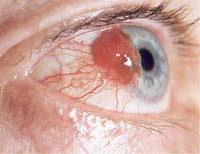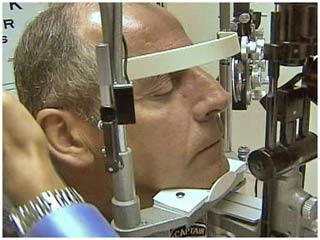Once the eye tumor melts, the new drug combination may help
Danh Phuong
According to a new study led by researchers at Duke University's Mixed Cancer Center - The combination of the two drugs shows promise in studying a kind of persistent and rare treatments. Or malignant tumors emanating from the eye then spread to other parts of the body.
Decitabine, which can activate certain genes in cancer cells, and the antibacterial protein interferon gamma, an immune system protein - can work together to kill cancer cells.
 Jared Gollob, MD, Duke's Medical Oncologist and lead investigator of the study, said: 'The toxic tumor with metastatic uveal, or malignant tumor, originates in the eyes and di Based on other parts of the body, the disease is very difficult to treat, in fact there are no effective treatments so far. This study could bring patients, who had very little hope of saving a promising new treatment. '
Jared Gollob, MD, Duke's Medical Oncologist and lead investigator of the study, said: 'The toxic tumor with metastatic uveal, or malignant tumor, originates in the eyes and di Based on other parts of the body, the disease is very difficult to treat, in fact there are no effective treatments so far. This study could bring patients, who had very little hope of saving a promising new treatment. '
The researchers published their findings in the September 1, 2007, issue of Clinical Cancer Research. The study was funded by the National Institutes of Health.
Gollob said the preclinical study closely followed previous experimental work, studying proteins called ' interferon' , derived from immune system cells. These proteins appear to enhance immune function and directly affect toxic tumor cells, limiting growth and accelerating their death.
Gollob said: ' We know a drug called decitibine that can activate genes that have been turned off in cancer cells, so we have to argue that if we include decitabine and interferon gamma, perhaps we will see even more cell death, and that happened exactly. Decitabine can activate certain genes, called S100A2, which in turn increase the sensitivity of cancer cells, then the interferon gamma protein ".

The combination of the two drugs is promising in studying a kind of persistent and rare treatment for malignant tumors that arise from the eye and then spread to other parts of the body.(Photo: Wral.com)
The researchers used human cell lines taken from patients diagnosed with toxic uveal tumors. The next step will be a clinical study, to carefully observe the effect of drug combination on human subjects.
Every year, between 5,000 and 10,000 people in the United States suffer from uveal malignant tumors. Unlike tumors on the skin, there are no known pathogens.
He said: 'Actually there is no truly effective treatment for this devastating disease. Therefore, the study is really a promising step towards discovering a real treatment that can help patients. '
UVeal malignant tumor starts from the iris of the eye, and symptoms include a change in vision like blurred vision. If detected early, it can be treated by radiation or by removing the eye. When the disease spreads, the characteristic of the toxic disease of uveal tumor is not easy to accept the standard diet during treatment, as well as the method of chemotherapy. Average, the time when the disease spreads Once is from about 6 to 10 months.
Duke Sciambi of Duke University is a co-author in this study.
Note: This report is adapted from a news release published by Duke University Medical Center.
- Mapping the DNA of the tumor
- Track tumor growth through 3D technology
- A new targeted drug could reduce 67% of all cancer cancers in humans
- The tumor was 'wingless and flew' right before the surgery
- The US makes super-self-contained capsules to deliver drugs to tumors
- Surgical tumor from the womb
- Find the clues that cause cancer resistance
- City Ho Chi Minh will be 'submerged' if the 2 pole ice melts
- How to deal with drug poisoning
- How to provide first aid to people who have drug shock
- Sea level will rise by 20m if the Earth's ice melts
- Atrophy of the tumor in just one day
 Green tea cleans teeth better than mouthwash?
Green tea cleans teeth better than mouthwash? Death kiss: This is why you should not let anyone kiss your baby's lips
Death kiss: This is why you should not let anyone kiss your baby's lips What is salmonellosis?
What is salmonellosis? Caution should be exercised when using aloe vera through eating and drinking
Caution should be exercised when using aloe vera through eating and drinking